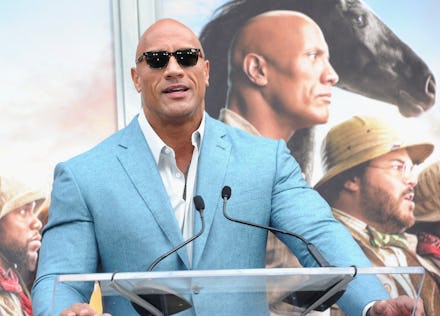What should we make of The Rock's inscrutable politics?

Ever the paragon of inoffensive, beefy centrism, Dwayne “The Rock” Johnson did the most natural, but unprecedented thing over the weekend by endorsing Joe Biden and Kamala Harris for the White House. In a skintight long sleeve tee that either made him look like an inflated, muscly Halloween costume or the Fruit of the Loom grapes, Johnson announced his first-ever presidential endorsement in a video posted to his social media accounts on Sunday. “Progress takes courage, humanity, empathy, strength, KINDNESS & RESPECT,” he wrote on Twitter, attached to a video message and taped interview with Biden and Harris.
Although much of his talk with the Democratic ticket focuses on lofty, basic liberal fixations like respect, truth, and trust, Johnson wasn’t spared of MAGA-ites disowning him for life in the top Instagram comments (or an instant copypasta about "burning his movie's.") None of what he discusses is particularly novel, surprising, or transcends above kid stuff compared to the raging pandemic that’s already killed 200,000 Americans and counting, the collapse of our social safety net, and a racist police state that discriminately kills without impunity. And yet, it was still something of a leap for Johnson and his inscrutable politics.
Although this was technically his first presidential endorsement, the milquetoast gesture wasn’t Johnson’s first foray into national politics. In the thick of his WWE heyday, he delivered a bizarre speech at the 2000 Republican National Convention — and also attended the DNC later that same month, but didn’t speak. In the interceding years, he’s palled around with Elizabeth Warren over her Ballers superfandom, got news of Osama bin Laden’s death before almost every other private citizen, and shied away from coveted endorsements before the 2016 election.
There was a weird temptation to anoint any number of celebrities to high office in the afterglow of Trump’s political rise. Johnson was at the center of this, in addition to early Kanye 2020 rumblings and pundits credulously considering an Oprah presidential run after a rousing speech at the 2018 Golden Globes. He was featured in a 2017 GQ cover story, headlined “Dwayne Johnson for President,” which directly asked him about a political future some pundits had been fanficing even before Trump was elected. “I think that it’s a real possibility,” he told GQ’s Caity Weaver of a presidential run, before very diplomatically evading condemnation of Trump and any policy specifics. When Weaver asked how Trump’s doing so far in the infancy of his first term, Johnson offered this:
“Mmm… With any job you come into, you've got to prove yourself. And…” Johnson pauses, performing lightning-fast mental calibrations. “Personally, I feel that if I were president, poise would be important. Leadership would be important. Taking responsibility for everybody. [If I didn't agree with someone] on something, I wouldn't shut them out. I would actually include them. The first thing we'd do is we'd come and sit down and we'd talk about it. It's hard to categorize right now how I think he's doing, other than to tell you how I would operate, what I would like to see.”
Whether you credit it to Trump’s immense unpopularity or the years of his unmasked bigotry compounding, Johnson’s finally shed trepidation toward taking a stance against the president, similar to Taylor Swift’s calibrated shift into more overt political speech. If the Nates and Jons are to be believed, there aren’t nearly as many undecided voters up for grabs this time around, so rampant attempts to delegitimize mail-in voting and steal the election will have far greater impact than traditional persuasion. But videos like Johnson’s, however uncontroversial, hammer home the point that vague platitudes to Restore the Soul of America are always going to be an easier sell to wealthy centrists and Lincoln Project Republicans than policies that materially improve the vast majority of Americans’ lives.